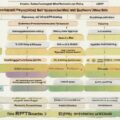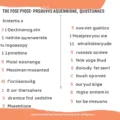Self-efficacy is a person’s belief in their ability to succeed in specific situations or accomplish a task. It plays a crucial role in how one approaches goals, tasks, and challenges. To measure self-efficacy, various scales and questionnaires have been developed. This article provides a comprehensive list of 12 self-efficacy scales and questionnaires that are widely used in research and practice.
Understanding Self-Efficacy
Before diving into the tools used to measure self-efficacy, it’s important to understand what it entails. Self-efficacy influences motivation, learning, and performance. It’s not about the skills one has, but rather the judgments of what one can do with those skills.
General Self-Efficacy Scale (GSE)
The General Self-Efficacy Scale is designed to assess a general sense of perceived self-efficacy with the aim to predict coping with daily hassles as well as adaptation after experiencing all kinds of stressful life events.
Bandura’s Self-Efficacy Scales
Developed by Albert Bandura, these scales are tailored to assess self-efficacy in various domains such as academic levels, health, and organization.
The Perceived Self-Efficacy in Patient-Physician Interactions Scale
This scale measures patients’ confidence in communicating with their physicians and understanding medical information.
The Teacher Self-Efficacy Scale
A specialized scale meant for educators to assess their confidence in their teaching abilities, classroom management, and student engagement.
The Career Self-Efficacy Scale
Assesses an individual’s belief in their ability to successfully perform tasks related to their career development and work life.
The Exercise Self-Efficacy Scale
Focuses on an individual’s belief in their ability to engage in exercise within various contexts and adhere to an exercise regimen.
Additional Self-Efficacy Scales
- Social Self-Efficacy Scale
- Academic Self-Efficacy Scale
- Children’s Self-Efficacy Scale
- Math Self-Efficacy Scale
- Entrepreneurial Self-Efficacy Scale
- Environmental Self-Efficacy Scale
FAQs on Self-Efficacy Scales & Questionnaires
What is the purpose of self-efficacy scales?
Self-efficacy scales are designed to assess an individual’s belief in their ability to execute behaviors necessary to produce specific performance attainments.
Can self-efficacy scales be used in clinical practice?
Yes, these scales can be used in clinical settings to assess patient confidence in managing health conditions, which can inform treatment strategies.
Are self-efficacy scales reliable?
Many self-efficacy scales have been tested for reliability and validity and are considered reliable tools when used appropriately.
Do self-efficacy scales vary by age group?
Yes, there are scales designed specifically for children, adolescents, and adults, as self-efficacy beliefs can differ by age group.
How are the results of self-efficacy scales used?
The results can be used for personal development, educational and career guidance, and to enhance performance in various domains of life.









